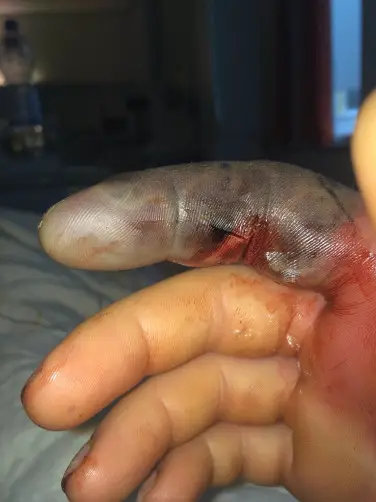The king cobra, also known as the “Ophiophagus hannah,” is one of the deadliest snakes in the world. Its venom can cause severe pain, respiratory failure, and even death. The effects of a king cobra bite can be devastating, and understanding them is crucial for anyone living in areas where these snakes are prevalent.
In this article, we’ll explore the symptoms and consequences of a king cobra bite. From the initial impact to the long-term effects, we’ll delve into the details of how this venomous snake can impact its victims. So, if you’re curious about what happens when a king cobra sinks its fangs into a human, keep reading!

What Are the Effects of a King Cobra Bite?
King cobras are one of the most venomous snakes in the world. They are found in Southeast Asia and can grow up to 18 feet in length. A bite from a king cobra can be fatal, and it is important to know the effects of a king cobra bite.
Immediate Effects
When a king cobra bites, it injects a large amount of venom into the victim’s body. The venom contains neurotoxins that affect the nervous system and cardiotoxins that affect the heart. The immediate effects of a king cobra bite include:
Pain and Swelling: The venom causes intense pain and swelling at the site of the bite. The affected area may turn blue or black.
Nausea and Vomiting: The venom can cause nausea and vomiting within minutes of the bite.
Dizziness and Weakness: The venom can cause dizziness and weakness, and the victim may feel faint.
Difficulty in Breathing: The venom can cause respiratory distress, making it difficult for the victim to breathe.
Delayed Effects
The delayed effects of a king cobra bite can be more severe than the immediate effects. These effects can occur hours or even days after the bite and may include:
Paralysis: The venom can cause paralysis, starting with the facial muscles and moving down to the limbs.
Organ Damage: The venom can cause damage to the kidneys, liver, and other organs.
Bleeding: The venom can cause bleeding from the gums, nose, and other parts of the body.
Death: In severe cases, a king cobra bite can be fatal.
Treatment
Immediate treatment is crucial after a king cobra bite. The victim should be taken to a hospital as soon as possible. The following treatments may be administered:
Antivenom: Antivenom is the only treatment that can neutralize the venom in the body. The victim may require multiple doses of antivenom.
Pain Management: Pain management medications may be given to relieve the pain at the site of the bite.
Respiratory Support: If the victim is having difficulty breathing, respiratory support may be provided, such as oxygen therapy or intubation.
Prevention
Prevention is the best way to avoid a king cobra bite. The following measures can be taken to prevent a king cobra bite:
Avoidance: Avoid areas where king cobras are known to live, such as dense forests and grasslands.
Protective Clothing: Wear protective clothing, such as boots and long pants, when in areas where king cobras are known to live.
Be Aware: Be aware of your surroundings and watch where you step or place your hands.
Professional Help: If you suspect a king cobra is in your area, seek the help of a professional snake handler to remove it.
In conclusion, a king cobra bite can have serious and potentially fatal effects. Immediate treatment is crucial, and prevention is the best way to avoid a bite. By being aware of your surroundings and taking the necessary precautions, you can reduce your risk of a king cobra bite.
Frequently Asked Questions
What are the effects of a King Cobra bite?
A King Cobra bite can have severe effects on the body. The venom of the King Cobra is neurotoxic, which means it attacks the nervous system. The venom can cause paralysis and respiratory failure, which can be fatal if not treated immediately. The bite can also cause severe pain, swelling, and bleeding.
The symptoms of a King Cobra bite can vary depending on the amount of venom injected and the location of the bite. Some common symptoms include nausea, vomiting, dizziness, and difficulty breathing. In severe cases, the bite can lead to convulsions, coma, and death. It is important to seek medical attention immediately if you suspect you have been bitten by a King Cobra.
A case of Cobra Bite Emergency (Snake Venom Animation)
In conclusion, a king cobra bite can have devastating effects on both humans and animals. The venom of this snake can cause severe pain, swelling, and tissue damage, leading to respiratory failure and even death in some cases.
However, there is hope for those who are bitten by a king cobra. Antivenom is available, and prompt medical attention can greatly increase the chances of survival. Additionally, measures can be taken to prevent encounters with these dangerous snakes, such as avoiding their habitats and wearing protective gear when working in areas where they are known to live.
Overall, while the effects of a king cobra bite can be severe, it is important to remember that there are ways to stay safe and minimize the risk of encountering these deadly creatures. By taking precautions and seeking medical attention immediately if bitten, we can help to ensure that the impact of these bites is minimized as much as possible.


